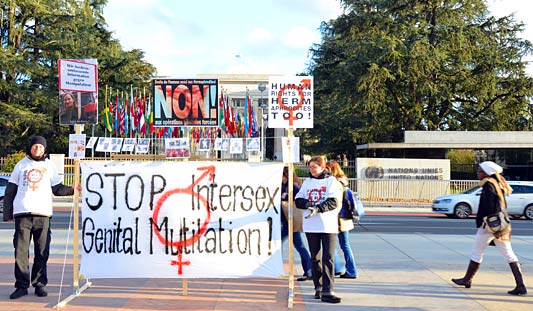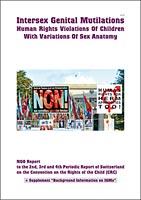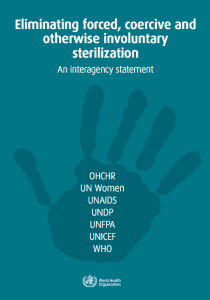WHO, OHCHR, UNICEF + 4 mehr verurteilen Intersex-Sterilisationen + IGM und fordern Aufarbeitung + Wiedergutmachung!
By seelenlos on Friday, May 30 2014, 22:19 - Forderungen - Permalink
 Zwischengeschlecht.org hat zum WHO-Statement beigetragen. Foto: UPR #14, 20.10.2012
Zwischengeschlecht.org hat zum WHO-Statement beigetragen. Foto: UPR #14, 20.10.2012
Hipp, hipp! Der Kampf gegen Intersex-Genitalverstümmelungen siegt weiter!
Die Weltgesundheitsorganisation (WHO) hat zusammen mit dem
- Büro des UNO-Hochkommissars für Menschenrechte (OHCHR)
- UN Women,
- UNAIDS, dem
- Entwicklungsprogramm der Vereinten Nationen (UNDP), dem
- Bevölkerungsfonds der Vereinten Nationen (UNFPA) und dem
- Kinderhilfswerk der Vereinten Nationen (UNICEF)
ein gemeinsames Interagency Statement herausgegeben zur
>>> "Beendigung von erzwungenen, aufgezwungenen oder sonstwie unfreiwilligen Sterilisierungen" (englisch).
Darin finden sich sehr deutliche Worten zu Kastrationen an Intersex-Kindern, aber auch zu IGM allgemein.
Und ebenso deutliche Forderungen an verantwortliche Staaten und Institutionen, inkl.
- unabhängige Untersuchung aller Fälle
- gesellschaftliche Anerkennung, Aufarbeitung und Entschuldigung
- Datenerfassung und Monitoring
- angemessene Benachrichtigung aller ohne ihr Wissen Behandelten
- Ermöglichung von administrativen und juristischen Wiedergutmachungserfahren inkl. Prozesskostenhilfe.
Markus Bauer und Daniela Truffer (Zwischengeschlecht.org) haben die WHO zu diesem Statement beraten, zusammen mit Vertreter_innen anderer Intersex-Organisationen, u.a. Anne Tamar-Mattis (Advocates for Informed Choice, USA) und Mauro Cabral (Argentinien). Bleibt zu hoffen, dass vergleichbare Forderungen bald auch zu allen anderen übrigen IGM-Formen konkretisiert – und umgesetzt werden. Es ist noch ein weiter Weg ...
Nach dem Break relevante Ausschnitte (englisch) aus dem Bericht:
 Intersex Genital Mutilations
Intersex Genital Mutilations
Human Rights Violations Of Children With Variations Of Sex Anatomy
2014 NGO Report to the UN Committee on the Rights of the Child (CRC)
>>> Download PDF (3.65 MB) >>> Table of Contents
>>> Intersex-Genitalverstümmelungen (IGM): Typische Diagnosen und Eingriffe
>>> IGM – eine Genealogie der TäterInnen
>>> Download ganzes WHO Interagency Statement zu "Involuntary sterilization"
Background
Some groups, such as […] intersex persons, also have a long history of discrimination and abuse related to sterilization, which continues to this day. […] Intersex persons, in particular, have been subjected to cosmetic and other nonmedically necessary surgery in infancy, leading to sterility, without informed consent of either the person in question or their parents or guardians. Such practices have also been recognized as human rights violations by international human rights bodies and national courts (15, 64).
[…] [I]ntersex persons
Intersex persons may be involuntarily subjected to so-called sex-normalizing or other procedures as infants or during childhood, which, in some cases, may result in the termination of all or some of their reproductive capacity. Children who are born with atypical sex characteristics are often subjected to cosmetic and other non-medically indicated surgeries performed on their reproductive organs, without their informed consent or that of their parents, and without taking into consideration the views of the children involved (64; 147, para 57; 148; 149). As a result, such children are being subjected to irreversible interventions that have lifelong consequence for their physical and mental health (64; 150, para 20; 151).
Medical procedures that might result in sterility may sometimes be justified because of benefits to health, including the reduction of cancer risk (152). Such treatments may be recommended for […] intersex persons; however, they may be proposed on the basis of weak evidence, without discussing alternative solutions that would retain the ability to procreate (151, 153–157). Parents often consent to surgery on behalf of their intersex children, including in circumstances where full information is lacking (151, 158, 159).
It has been recommended by human rights bodies, professional organizations and ethical bodies that full, free and informed consent should be ensured in connection with medical and surgical treatments for intersex persons (64, 150) and, if possible, irreversible invasive medical interventions should be postponed until a child is sufficiently mature to make an informed decision, so that they can participate in decision-making and give full, free and informed consent (15, 149). It has also been recommended that health-care professionals should be educated and trained about bodily diversity as well as sexual and related biological and physical diversity, and that professionals should properly inform patients and their parents of the consequences of surgical and other medical interventions (149; 150, para 20; 160–162).
Remedies and redress
- Recognize past or present policies, patterns or practices of coercive sterilization, and issue statements of regret or apology to victims, as components of the right to remedy for these practices.
- Provide notification, through appropriate and humane means, to people who have been subjected to coercive sterilization, and who may be unaware of their situation, and provide information on the possibility of seeking administrative and judicial redress.
- Promptly, independently and impartially investigate all incidents of forced sterilization with due process guarantees for the alleged suspect, and ensure appropriate sanctions where responsibility has been established.
- Provide access, including through legal aid, to administrative and judicial redress
- mechanisms, remedies and reparations for all people who were subjected to forced, coercive or involuntary sterilization procedures, including compensation for the consequences and acknowledgement by governments and other responsible authorities of wrongs committed. Enable adults to seek redress for interventions to which they were subjected as children or infants.
- Guarantee access to reversal procedures, where possible, or assisted reproductive technologies for individuals who were subjected to forced, coercive or otherwise involuntary sterilization.
Monitoring and compliance
- Establish monitoring mechanisms for the prevention and documentation of forced, coercive and otherwise involuntary sterilization, and for the adoption of corrective policy and practice measures.
- Collect data regarding forced, coercive and otherwise involuntary sterilization, in order to assess the magnitude of the problem, identify which groups of people may be affected, and conduct a comprehensive situation and legal analysis.
- Providers of sterilization services should implement quality improvement programmes to ensure that recommendations aimed at preventing forced, coercive and otherwise involuntary sterilization are followed and procedures are properly documented.
- Establish mechanisms for obtaining patient feedback on the quality of services
received, including from marginalized populations.
>>> Download ganzes WHO Interagency Statement zu "Involuntary sterilization"
 Intersex Genital Mutilations
Intersex Genital Mutilations
Human Rights Violations Of Children With Variations Of Sex Anatomy
2014 NGO Report to the UN Committee on the Rights of the Child (CRC)
>>> Download PDF (3.65 MB) >>> Table of Contents
>>> Intersex-Genitalverstümmelungen (IGM): Typische Diagnosen und Eingriffe
>>> IGM – eine Genealogie der TäterInnen
>>> Zwangsoperierte Zwitter über sich selbst und ihr Leben
>>> UN-Auschuss gegen Folter fordert Entschädigung für IGMs
>>> UN-Sonderberichterstatter über Folter verurteilt "genitale Zwangsoperationen"
>>> Europarat verurteilt Intersex-Genitalverstümmelungen (IGM)








